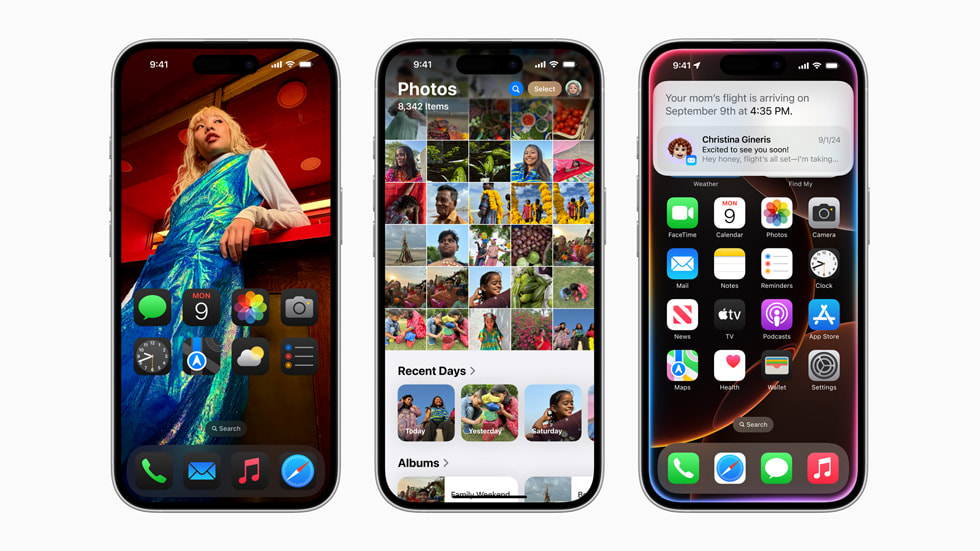Apple has officially launched its latest software update, infusing its iPhone 16 lineup with artificial intelligence features that promise to transform the user experience. As the tech giant steps boldly into the AI era, it seeks to redefine its iconic smartphone and enhance its virtual assistant, Siri, making her a more engaging and versatile companion.
This free software update to iOS 18 arrived just over a month after the release of the iPhone 16 models, which boast a specialized chip capable of supporting these advanced AI functionalities. The iPhone 16 lineup, ranging in price from $800 to $1,200, was designed to not just meet the demands of consumers but also to position Apple competitively within the burgeoning AI landscape. Even last year’s premium models, the iPhone 15 Pro and Pro Max, are set to benefit from the new software update, opening the door for a larger user base to access these innovative features.

However, for those outside the U.S., the rollout of AI capabilities won’t happen until next year, with no specific date announced yet. Apple has spent weeks testing the AI software with a select group of iPhone users who volunteered to help refine the technology. This careful approach reflects Apple’s commitment to ensuring a polished user experience.
The centerpiece of this AI transformation is Siri, Apple’s long-maligned virtual assistant. No longer just a basic voice command tool, Siri is set to become a more conversational and colorful companion, with a glowing light encircling the iPhone screen as she processes requests. Apple promises that Siri will handle more complex tasks with ease, though full integration with third-party apps will require an additional software update in the future.
But Siri isn’t the only AI feature making its debut. The software update introduces a suite of tools designed to assist users in various ways. From writing and proofreading messages to summarizing emails, the AI is geared towards enhancing productivity. Users can also look forward to editing tools that make it easier to manage photos, including searching for old pictures effortlessly.

Perhaps one of the most exciting future features is the ability to create custom emojis and generate whimsical imagery upon request. Apple also has plans to incorporate ChatGPT into its AI suite, allowing users to tap into even more advanced conversational capabilities. While many of these AI functions are already available on Android devices from competitors like Samsung and Google, Apple’s approach is unique and tailored to its ecosystem.
In a bid to set itself apart, Apple has branded its AI offerings as “Apple Intelligence.” The company emphasizes that its features prioritize user privacy, with many processes occurring directly on the device or within secure data centers, rather than relying on remote servers.
With a significant portion of the global iPhone user base still using older models that lack the necessary chip for these AI advancements, Apple anticipates a surge in demand for the new iPhone 16 models, especially as the holiday season approaches. This expectation has been reflected in the stock market, where Apple’s shares have soared by 18% since the unveiling of its AI strategy, boosting its market value by around $500 billion. The company is edging closer to becoming the first U.S. entity to achieve a market valuation of $4 trillion.

Investors and analysts alike are keenly awaiting Apple’s quarterly financial report, which will provide insights into how well the iPhone 16 is performing, particularly during the initial days of its launch. Early indicators show that interest in high-end models, like the iPhone 15, is also on the rise, thanks to lower prices and the excitement surrounding Apple’s entry into the AI space.
Yet, there’s an intriguing question on many minds: will the promise of new AI capabilities persuade current iPhone owners to upgrade their devices? Analysts suggest that as Apple gradually rolls out more features, many users may choose to invest in the new models, effectively “future-proofing” their purchases.
On the same day as the AI update, Apple made headlines by announcing that certain models of its AirPods can now function as hearing aids, a development that could have a profound impact on the estimated 30 million Americans experiencing hearing loss. This innovative use of technology demonstrates Apple’s commitment to accessibility and enhancing everyday life for its users.
While Apple may not be the first to introduce AI features, CEO Tim Cook has expressed confidence in the company’s approach, stating that they are “perfectly fine with not being first” and that they prioritize getting the technology “really great.”

As we enter this exciting new chapter with Apple Intelligence, the tech world is watching closely to see how these innovations will shape the future of the iPhone and the broader smartphone landscape. With a blend of enhanced capabilities and a focus on user privacy, Apple is poised to redefine what it means to interact with technology in the digital age. The journey has just begun, and it promises to be an exhilarating ride.
Copyright©dhaka.ai
tags: Artificial Intelligence, Ai, Dhaka Ai, Ai In Bangladesh, Ai In Dhaka, Future of AI, Artificial Intelligence in Bangladesh, Apple



